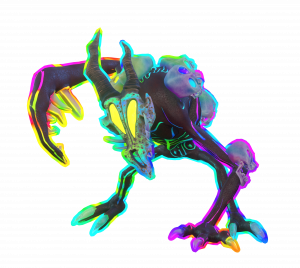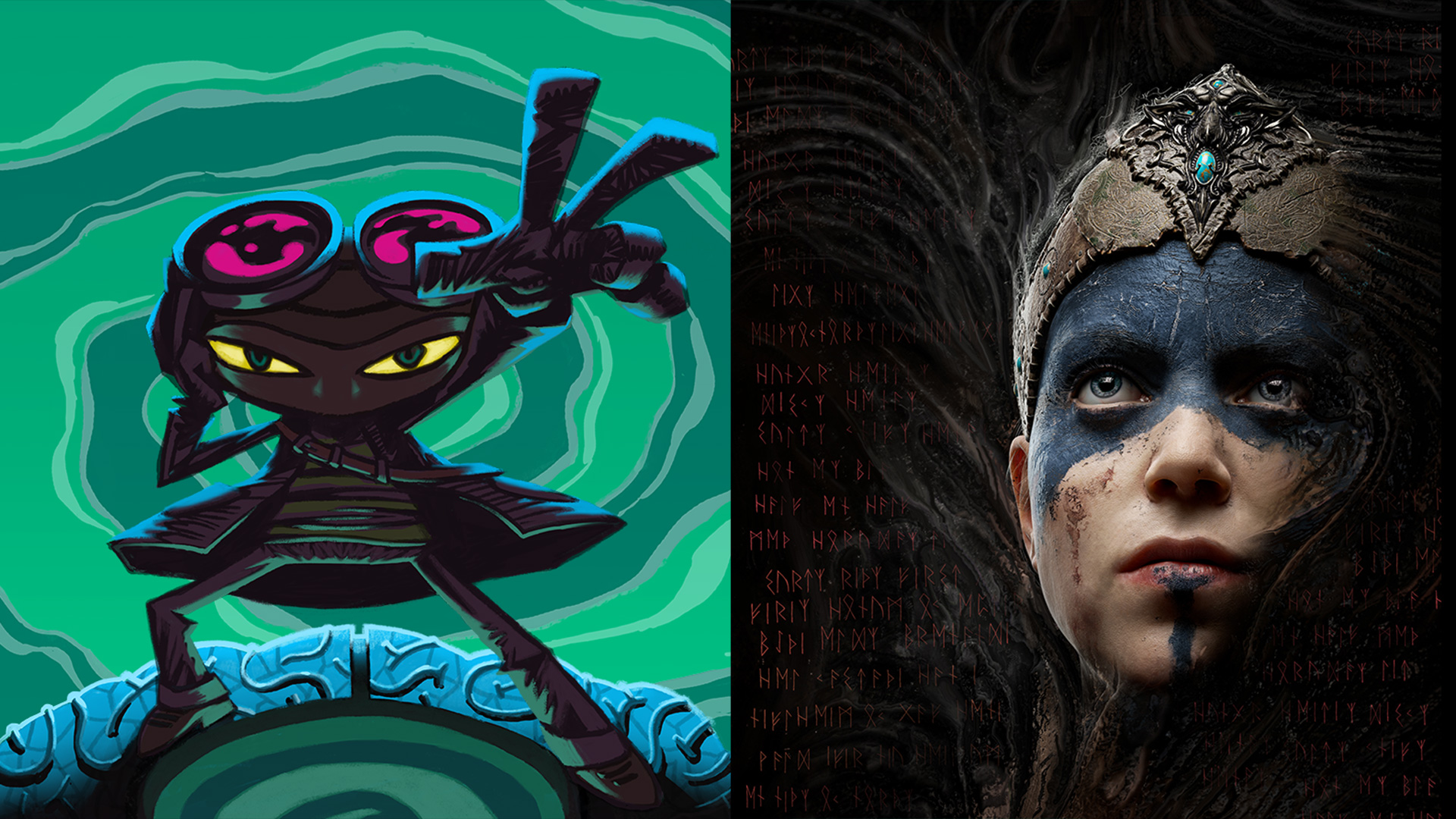As a child, John Kieswetter played video games with his younger sister and two cousins who lived nearby as often as he could.
Kieswetter kept playing into adulthood and became even more passionate about gaming. He enjoyed playing with friends and meeting new friends through gaming. Gaming was a community, and gamers were his people. Kieswetter is now an Xbox Ambassador who loves helping other gamers.
When Kieswetter’s sister died unexpectedly almost a decade ago from complications following a surgery, gaming provided a refuge from his overwhelming grief and sadness. When he felt up to it, Kieswetter would play games, and sometimes he’d talk with his gamer friends about what he was going through. Many of them reached out to offer support.
“Gaming gets your mind off things for a little while, and that helps,” says Kieswetter, who lives in Ontario, Canada. “Gaming has had a huge impact on me as far as my mental health. The friends I have made over the years are so incredibly supportive and I consider them family. They have been there for me, and I’m there for them.”
Learning from video games ended up giving me social scripts that I could carry forward in my day-to-day life.
Like many people worldwide, Kieswetter has turned to gaming to cope with the isolation and anxiety of the past year. A recent Microsoft study within the Xbox Research Accessibility Community Feedback Program, a group made up of players with disabilities, looked at gaming and mental health during the pandemic. The study found that 84% of respondents agreed gaming has positively impacted their mental health over the past year, while 71% said gaming helped them feel less isolated.
Those findings are particularly resonant as people worldwide mark Mental Health Awareness Month this May, some 16 months into the pandemic. But even before the pandemic, researchers have cited the benefits of gaming on mental health, and game creators have in recent years begun portraying mental illness in games in more thoughtful and less stigmatizing ways than in the past.
Those include Hellblade: Senua’s Journey, whose main character struggles with psychosis; Celeste, about the quest of a girl who has anxiety to climb a mountain; and Psychonauts, about a boy who projects himself into other people’s mental worlds and helps them fight their demons.
Kelli Dunlap, a clinical psychologist who has a master’s in game design, says video games can help people living with mental illness by providing a way to relax, connect with others and feel competent.
“We know that games are exceptionally good at helping us feel like our decisions matter, and that we can have power over the world around us and that we can have a sense of accomplishment,” says Dunlap, who is based in Rockville, Maryland.
“These are things that are crucial to mental wellbeing in general, but they’re not things that we get a lot of in our daily activities. Even if you don’t dislike your job, you’re probably not getting all the mental health vitamins, so to speak, out of your job. So games can be incredibly helping in meeting needs that are not being met otherwise.”
For people with severe mental illness, Dunlap says, games can help counteract the self-defeating narratives that often accompany conditions such as anxiety and depression, “when our brains lie to us and tell us, ‘You’re no good, you’ll never accomplish anything, you’re worthless.’
“People rarely have that experience when they’re playing games, because games induce the opposite — you’re the hero, you are Master Chief saving the universe from intergalactic space zombies,” she says. “You can do the thing, and there’s constant feedback about ‘you’re doing good and you’re progressing.’”
Dunlap uses video games in her clinical practice and co-facilitates a therapeutic Dungeons & Dragons group that uses the popular role-playing game to teach a range of skills such as communicating and problem-solving. Role-playing has a long tradition in psychotherapy, she says, and can be “incredibly powerful” for people who have anxiety.
“Being able to take on the mantle of someone strong and powerful and capable can have a really positive therapeutic impact on the person playing,” she says.
Raffael Boccamazzo understands that as well as anyone. He became fascinated at an early age with video games, which offered a predictable framework and made sense to him in a way that social interactions with his peers often didn’t. Through gaming, he felt a sense of empowerment and capability that could be elusive in real life.
Boccamazzo got into role-playing games in his teens, and in his early 20s realized that the charismatic, extroverted characters he played in games, who were “sort of a fantasy wish fulfillment” for him, came from within him. If he could play that person in a game, he reasoned, he could be that person in real life.
“It just became a question of transferring it over, using some of the same skills I used at the gaming table in real life,” says Boccamazzo, who lives in Seattle. “In a way, learning from video games ended up giving me social scripts that I could carry forward in my day-to-day life.”
Boccamazzo, who was diagnosed with autism at 35, went on to become a doctor of clinical psychology and an expert on the use of tabletop role-playing games in clinical and educational settings. “Doctor B,” as he’s known, is now the clinical director of Take This, a nonprofit based in Kirkland, Washington, that focuses on combating stigma and increasing support for mental health in the gaming community. (Dunlap is the organization’s community manager.)
In 2019, Boccamazzo helped create a Dungeons & Dragons adventure in which players enter the subconscious mind of a young woman to battle the monsters of anxiety and depression plaguing her. Gardens of Fog aims to depict some of the ways anxiety and depression can affect people, Boccamazzo says, and draws from his own experience with both issues.
Boccamazzo and others emphasize the need to involve people who have experienced mental health challenges from the start when creating any game depicting mental illness. Even before that, Boccamazzo says, game creators should ask themselves why they want to depict mental illness and what purpose it serves.
“Whose story are they telling, and are they using mental illness or mental health challenges as a vehicle?” he says. “There are lots of other compelling stories you can tell.”
Mental illness is not a plot twist. Trauma is not a plot point.
Tanya DePass, a Take This ambassador who lives in Chicago, says mental illness is often used as a justification for game villains’ actions. Instead, she says game creators should “explore reasons for someone to do bad things other than mental illness.
“Because doing that reinforces the idea that mentally ill people are dangerous. And the most dangerous a mentally ill person is is to themself, not society.”
Negative tropes about mental illness — the mad scientist, the psycho killer, the insane asylum — have existed in video games since at least the early ‘80s, Dunlap says. But the game industry, she says, is ahead of the curve in depicting mental illness in more positive ways than in film and television.

Monsters depict characters’ inner struggles in the game Psychonauts. (Image courtesy of Double Fine Productions)
“It’s not that games do it badly; it’s that society does it badly, and games are in some respects a reflection of society and its values.”
Nearly half of Americans are projected to have a diagnosable mental illness in their lifetime. And with 75% of U.S. households having at least one person who plays video games, Dunlap says, game developers need to consider that their audiences will invariably include people who have mental illness.
“If you’re putting out a stereotypical portrayal of mental illness, you can be doing a lot of harm, because individuals with mental illness are a vulnerable population,” she says.
“If you want to address something like suicide in a game, that’s a very emotionally triggering kind of content. It’s not that you can’t include it, but be mindful about how you’re doing it.
“Are you doing it for a wow factor or a plot twist? If so, don’t,” Dunlap says. “Mental illness is not a plot twist. Trauma is not a plot point.”
When Dom Matthews and Tameem Antoniades set out to make what would become Hellblade, they decided to center the game on a character who experiences psychosis. They thought Senua’s unique way of interacting with and seeing the world would make for a compelling game and journey but understood the gravity of taking on an oft-maligned and misunderstood illness.
“We knew that we had to do our research. We had to get it right,” says Matthews, the studio head for Ninja Theory, a Cambridge, England-based video game studio that is part of Xbox Game Studios.
“We had to do it justice and tell a story that would be truthful to someone who experiences psychosis.”
So Matthews and Antoniades, Ninja Theory’s co-founder, reached out to the nearby University of Cambridge and connected with Paul Fletcher, a professor of health neuroscience who specializes in psychosis. Fletcher did a presentation about psychosis to the project’s development team, then connected them with people who had experienced psychosis.
Matthews and his team would meet with the group and listen to their experiences, then try to replicate those through audio and visual content. Then they’d go back and show the group what they’d developed and ask for their feedback.
That input informed how the voices Senua hears are depicted in the game — instead of just adding voices, the team used binaural audio, a way of recording sound that uses two microphones to create a 3D effect, to reflect how people with psychosis hear voices externally and from various directions.
“That was one of the things the group really loved,” Matthews says. “It felt so genuine to them.”
Similarly, the development team learned through those conversations that though the experience of psychosis can be very difficult, it can also have moments of positivity and warmth, Matthews says. That reality is reflected in a moment when Senua steps into a sunlight-soaked scene bathed in radiance and color. One woman in the group told Matthews the scene was her favorite part of the game because it showed the “sheer beauty” that can come with psychosis.
“If we didn’t have that collaboration, we never would have learned those things,” Matthews says.
Hellblade won multiple awards, including one from the Royal College of Psychiatrists, and was broadly heralded by critics. But it was the messages that poured in from fans, compiled in a touching video, that meant the most to Matthews. They wrote that Senua’s journey made them feel seen and understood, less alone, that the game gave voice to what they’d felt but struggled to express.
“We achieved success from whichever perspective you look at it, and that’s great,” Matthews says. “But by far the most fulfilling of those successes is meeting those people and reading comments from people about how the game impacted them.”
Tim Schafer didn’t set out to make a game about mental health when he created Psychonauts, released in 2004. But the game focused on the inner struggles of its characters and conveyed a hopeful message about healing.
As he began working on Psychonauts 2, to be released later this year, Schafer took a more intentional approach to the issues the game’s characters were grappling with, from anxiety to addiction.
During the development process, Schafer and his team at Double Fine Productions, which is part of Xbox Game Studios, would play the game together, then sit and talk about it. Team members would share experiences from their own lives and offer thoughts on how to represent those issues most authentically.
Schafer also consulted with mental health experts including Boccamazzo. That input led to the inclusion of a content warning for the game and some language changes. Schafer believes games depicting mental health issues can be helpful, provided those portrayals are sensitive and informed by experience.
“Showing someone positively healing and dealing with some of these problems … it’s not an instant fix or anything, but I feel like just showing that can be a positive step for people,” he says.
“I think gaming is a proxy for facing troubles in your own life. It’s a very low-stakes way to experience emotions and anxieties and go through them in a safe way and build up the capacity to do that in the real world.”
A 2016 study of almost 100 of the highest-selling video games found that more than one-quarter depicted at least one character with mental illness, but most were of the “homicidal maniac” variety. Dunlap says that’s changing, with games like Hellblade and others, such as Adventures with Anxiety and Stardew Valley, portraying mental illness with more empathy and understanding.
“There’s a lot of innovative stuff coming out of indie game studios,” she says. “I’m very excited about that transition.”
Game creators have only recently started to more explicitly address mental health challenges in video games. Tara Voelker, one of Xbox’s accessibility program managers, says that while game developers are attuned to thinking about accessibility in gaming for people with physical disabilities, there’s less awareness about players with mental health issues.
“If you think about them in the same way you would think about any other group and accessibility, you can really help them and provide a great gaming experience for them,” she says.
“I think the accessibility space is growing and more becoming inclusive, and so we have to do that education now.” The Microsoft gaming accessibility team has started planning what that education for developers could look like as part of their future work.
A gamer herself, Voelker is open about her struggles with post-traumatic stress disorder and says games help channel her energy and divert her mind from potential triggers. Mental health issues are often isolating, but seeing those challenges reflected in games can help normalize mental illness and break down the stigma around it, Voelker says.
“We all have mental health struggles,” she says. “The more examples we can have out there, the more normal it becomes. The more we can help normalize mental health struggles, the more comfortable people will be talking about them and seeking care.”
Lead image: Psychonauts, left, and Hellblade: Senua’s Sacrifice.






